- Home
- Don DeLillo
Falling Man Page 15
Falling Man Read online
Page 15
Almost at once she came upon the derelict, the old thread-bare man, and he stood looking past her at the figure upended in midair. He seemed to be in a pose of his own, attached to this spot for half a lifetime, one papery hand clutching his bicycle wheel. His face showed an intense narrowing of thought and possibility. He was seeing something elaborately different from what he encountered step by step in the ordinary run of hours. He had to learn how to see it correctly, find a crack in the world where it might fit.
He didn’t see her when she went by. She couldn’t seem to walk quickly enough, passing more projects or the same spreading development, one street and then another. She kept her head down, seeing things as fleeting shimmers, a coil of razor wire atop a low fence or a police cruiser going north, the way she’d come, a blue-white flare with faces. This made her think of him back there, suspended, body set in place, and she could not think beyond this.
She found she was running now, shoulder bag bouncing against her hip. She kept the things they wrote, the early-stage members, placing the pages in a binder in her shoulder bag to be hole-punched and fitted in the rings when she got home. The street was nearly empty, a warehouse to her left. She thought of the police cruiser coming to a stop directly under the fallen man. She ran at a fair clip, the pages in the binder and the names of the members skimming through her mind, first name and first letter of last name, this was how she knew them and saw them, and the shoulder bag keeping time, knocking against her hip, giving her a tempo, a rhythm to maintain. She was running level with the trains now and then above them, running uphill into a ribbed sky with taller bundled clouds bleeding down into the low array.
She thought, Died by his own hand.
She stopped running then and stood bent over, breathing heavily. She looked into the pavement. When she ran in the mornings she went long distances and never felt this drained and wasted. She was doubled over, like there were two of her, the one who’d done the running and the one who didn’t know why. She waited for her breathing to ease and then stood upright. A couple of girls sat on a tenement stoop nearby, watching. She walked slowly to the top of the sloped street and then stopped again, remaining for some time with trains coming out of one hole and sinking into another, somewhere south of 100th Street.
She would take the pages home, the things they wrote, and place them with the earlier pages, hole-punched and fitted in the rings, numbering several hundred now. But first she would check the phone messages.
She crossed against the light and was standing on the crowded corner when she saw them coming toward her, running. They were bright and undisguised, moving past people wedged in routine anonymity. The sky seemed so near. They were bright with urgent life, that’s why they were running, and she raised a hand so they might see her in the mass of faces, thirty-six days after the planes.
IN NOKOMIS
He had his Visa card, his frequent-flyer number. He had the use of the Mitsubishi. He’d lost twenty-two kilos and converted this to pounds, multiplying by 2.2046. The heat on the Gulf Coast was fierce at times and Hammad liked it. They rented a little stucco house on West Laurel Road and Amir turned down an offer of free cable TV. The house was pink. They sat around a table on day one and pledged to accept their duty, which was for each of them, in blood trust, to kill Americans.
Hammad pushed a cart through the supermarket. He was invisible to these people and they were becoming invisible to him. He looked at women sometimes, yes, the girl at the checkout named Meg or Peg. He knew things she could never in ten lifetimes begin to imagine. In the drenching light he saw a faint trace of fine soft silky down on her forearm and once he said something that made her smile.
His flight training was not going well. He sat rocking in the simulator and tried to match responses to conditions. The others, most of them, did better. There was always Amir of course. Amir flew small planes and logged extra hours in Boeing 767 simulators. He paid in cash at times, using money wired from Dubai. They thought the state would read their coded e-mails. The state would check out airline databases and all transactions involving certain sums of money. Amir did not concede this. He received certain sums of money wired to a Florida bank in his name, first and last, Mohamed Atta, because he was basically nobody from nowhere.
They were clean-shaven now. They wore T-shirts and cotton slacks. Hammad pushed his cart down the aisle to the checkout and when he said something she smiled but did not see him. The idea is to go unseen.
He knew his weight in pounds but did not announce it to the others or glorify it to himself. He converted meters to feet, multiplying by 3.28. There were two or three of them in the house and others came and went but not with the frequency or the burning spirit of the days on Marienstrasse. They were beyond that now, in full and determined preparation. Only Amir burned now. Amir was electric, dripping fire from the eyes.
The weight loss had come in Afghanistan, in a training camp, where Hammad had begun to understand that death is stronger than life. This is where the landscape consumed him, waterfalls frozen in space, a sky that never ended. It was all Islam, the rivers and streams. Pick up a stone and hold it in your fist, this is Islam. God’s name on every tongue throughout the countryside. There was no feeling like this ever in his life. He wore a bomb vest and knew he was a man now, finally, ready to close the distance to God.
He drove the Mitsubishi down sleepy streets. One day, so strange, he saw a car with six or seven people crammed in, laughing and smoking, and they were young, maybe college kids, boys and girls. How easy would it be for him to walk out of his car and into theirs? Open the door with the car in motion and walk across the roadway to the other car, walk on air, and open the door of the other car and get in.
Amir switched from English to Arabic, quoting.
Never have We destroyed a nation whose term of life was not ordained beforehand.
This entire life, this world of lawns to water and hardware stacked on endless shelves, was total, forever, illusion. In the camp on the windy plain they were shaped into men. They fired weapons and set off explosives. They received instruction in the highest jihad, which is to make blood flow, their blood and that of others. People water lawns and eat fast food. Hammad ordered takeout at times, undeniably. Every day, five times, he prayed, sometimes less, sometimes not at all. He watched TV in a bar near the flight school and liked to imagine himself appearing on the screen, a videotaped figure walking through the gate-like detector on his way to the plane.
Not that they would ever get that far. The state had watch lists and undercover agents. The state knew how to read signals that flow out of your cell phone to microwave towers and orbiting satellites and into the cell phone of somebody in a car on a desert road in Yemen. Amir had stopped talking about Jews and Crusaders. It was all tactical now, plane schedules and fuel loads and getting men from one location to another, on time, in place.
These people jogging in the park, world domination. These old men who sit in beach chairs, veined white bodies and baseball caps, they control our world. He wonders if they think of this, ever. He wonders if they see him standing here, clean-shaven, in tennis sneakers.
It was time to end all contact with his mother and father. He wrote them a letter and told them he would be traveling for a time. He worked for an engineering firm, he wrote, and would soon be promoted. He missed them, he wrote, and then tore up the letter and let the pieces drift away in a rip-tide of memories.
In the camp they gave him a long knife that had once belonged to a Saudi prince. An old man whipped the camel to its knees and then took the bridle and jerked the head skyward and Hammad slit the animal’s throat. They made a noise when he did it, he and the camel both, braying, and he felt a deep warrior joy, standing back to watch the beast topple. He stood there, Hammad, arms spread wide, then kissed the bloody knife and raised it to the ones who were watching, the robed and turbaned men, showing his respect and gratitude.
One man on a visit did not know the name of the town they
were in, outside another town called Venice. He’d forgotten the name or had never learned it. Hammad thought it didn’t matter. Nokomis. What does it matter? Let these things fade into dust. Leave these things behind even as we sleep and eat here. All dust. Cars, houses, people. This is all a particle of dust in the fire and light of the days to come.
They passed through, one or two, now and then, and sometimes they told him about women they’d paid for sex, okay, but he didn’t want to listen. He wanted to do this one thing right, of all the things he’d ever done. Here they were in the midst of unbelief, in the bloodstream of the kufr. They felt things together, he and his brothers. They felt the claim of danger and isolation. They felt the magnetic effect of plot. Plot drew them together more tightly than ever. Plot closed the world to the slenderest line of sight, where everything converges to a point. There was the claim of fate, that they were born to this. There was the claim of being chosen, out there, in the wind and sky of Islam. There was the statement that death made, the strongest claim of all, the highest jihad.
But does a man have to kill himself in order to accomplish something in the world?
They had simulator software. They played flight-simulator games on their computer. The autopilot detects deviations from the route. The windshield is birdproof. He had a large cardboard illustration of the flight deck in a Boeing 767. He studied this in his room, memorizing the placement of levers and displays. The others called this poster his wife. He converted liters to gallons, grams to ounces. He sat in a barber chair and looked in the mirror. He was not here, it was not him.
He basically stopped changing his clothes. He wore the same shirt and trousers every day into the following week and underwear as well. He shaved but basically did not dress or undress, often sleeping in his clothes. The others made forceful comments. There was one time he took his clothes to the laundromat wearing someone else’s clothes. He wore these clothes for a week and wanted the other man to wear his clothes now that they were clean, although clean or dirty didn’t matter.
Wrong-eyed men and women laughing on TV, their military forces defiling the Land of the Two Holy Places.
Amir had made the pilgrimage to Mecca. He was a hajji, fulfilling the duty, saying the funeral prayer, salat al-janaza, claiming fellowship with those who’d died on the journey. Hammad did not feel deprived. They were soon to perform another kind of duty, unwritten, all of them, martyrs, together.
But does a man have to kill himself in order to count for something, be someone, find the way?
Hammad thought about this. He recalled what Amir had said. Amir thought clearly, in straight lines, direct and systematic.
Amir spoke in his face.
The end of our life is predetermined. We are carried toward that day from the minute we are born. There is no sacred law against what we are going to do. This is not suicide in any meaning or interpretation of the word. It is only something long written. We are finding the way already chosen for us.
You look at Amir and see a life too intense to last another minute, maybe because he never fucked a woman.
But what about this, Hammad thought. Never mind the man who takes his own life in this situation. What about the lives of the others he takes with him?
He was not eager to bring this up with Amir but did finally, the two of them alone in the house.
What about the others, those who will die?
Amir was impatient. He said they’d talked about such matters in principle when they were in Hamburg, in the mosque and in the flat.
What about the others?
Amir said simply there are no others. The others exist only to the degree that they fill the role we have designed for them. This is their function as others. Those who will die have no claim to their lives outside the useful fact of their dying.
Hammad was impressed by this. It sounded like philosophy.
Two women rustling through a park in the evening, in long skirts, one of them barefoot. Hammad sat on a bench, alone, watching, then got up and followed. This was something that just happened, the way a man is pulled out of his skin and then the body catches up. He followed only to the street where the park ended, watching as they disappeared, brief as turning pages.
The windshield is birdproof. The aileron is a movable flap.
He prays and sleeps, prays and eats. These are dumb junk meals often taken in silence. The plot shapes every breath he takes. This is the truth he has always looked for without knowing how to name it or where to search. They are together. There is no word they can speak, he and the others, that does not come back to this.
One of them peels an orange and begins to pick it apart.
You think too much, Hammad.
Men spent years organizing secretly this work.
Yes, okay.
I saw, myself, these men walking through the camp when we are there.
Okay. But the thinking is done.
And the talking.
Okay. Now we do it.
He hands a slice of orange over to Hammad, who is driving.
My father, the other man says, he would die three hundred times to know what we are doing.
We die once.
We die once, big-time.
Hammad thinks of the rapture of live explosives pressed to his chest and waist.
But don’t forget, we are being stopped any minute by the CIA, the other man says.
He says this and then he laughs. Maybe it’s not true anymore. Maybe it’s a story they’ve told themselves so many times that they’ve stopped believing it. Or maybe they didn’t believe it then and only begin to believe it now, nearing the time. Hammad sees nothing funny in this, either way.
The people he looked at, they need to be ashamed of their attachment to life, walking their dogs. Think of it, dogs scraping at dirt, lawn sprinklers hissing. When he saw a storm bearing in from the gulf he wanted to spread his arms and walk right into it. These people, what they hold so precious we see as empty space. He didn’t think about the purpose of their mission. All he saw was shock and death. There is no purpose, this is the purpose.
When he walks down the bright aisle he thinks a thousand times in one second about what is coming. Clean-shaven, on videotape, passing through the metal detector. The girl at the checkout rolls the soup can over the scanner and he thinks of something funny he can say, saying it internally first to get the word order right.
He looked past the mud-brick huts toward the mountains. Bomb vest and black hood. We are willing to die, they are not. This is our strength, to love death, to feel the claim of armed martyrdom. He stood with the others in the old Russian copper mine, an Afghan camp now, theirs, and they listened to the amplified voice calling across the plain.
The vest was blue nylon with crisscross straps. There were canisters of high explosive wired into the belt. There were slabs of plastique high on his chest. This was not the method he and his brothers would one day employ but it was the same vision of heaven and hell, revenge and devastation.
They stood and listened to the recorded announcement, calling them to prayer.
Now he sits in the barber chair, wearing the striped cape. The barber is a slight man with little to say. The radio plays news, weather, sports and traffic. Hammad does not listen. He is thinking again, looking past the face in the mirror, which is not his, and waiting for the day to come, clear skies, light winds, when there is nothing left to think about.
PART THREE
DAVID JANIAK
10
They walked the entire route, north for twenty blocks and then across town and finally down toward Union Square, a couple of miles in steam heat, with police in riot helmets and flak jackets, small children riding their parents’ shoulders. They walked with five hundred thousand others, a bright swarm of people ranging sidewalk to sidewalk, banners and posters, printed shirts, coffins draped in black, a march against the war, the president, the policies.
She felt remote from the occasion even as it pressed upon her. Pol
ice helicopters went beating overhead and there was a rank of men chanting and screaming at the marchers. Justin took a leaflet from a woman in a black headscarf. She had pigment dappled on her hands and looked off toward some middle distance, avoiding eye contact. People stopped to watch a burning float, papiermâché, and the crowd became more dense, collapsing in on itself. She tried to take the kid’s hand but that was over now. He was ten and thirsty and went dodging off to the other side of the street, where a man sold soft drinks from stacked crates. There were a dozen police nearby, positioned in front of red netting that was draped beneath a construction scaffold. This is where they would detain the overcommitted and uncontrollable.
A man came up to her, slouching out of the crowd, black man, hand on heart, and said, “This here’s Charlie Parker’s birthday.”
He was almost looking at her but not quite and then moved on and said the same thing to a man wearing a T-shirt inscribed with a peace sign and in his reproachful tone she caught the implication that all these people, these half million in their running shoes and sun hats and symbol-bearing paraphernalia, were shit-faced fools to be gathered in this heat and humidity for whatever it was that had brought them here when they might more suitably be filling these streets, in exactly these numbers, to show respect to Charlie Parker on his birthday.
If her father were here, if Jack, he would probably agree. And, yes, she felt a separation, a distance. This crowd did not return to her a sense of belonging. She was here for the kid, to allow him to walk in the midst of dissent, to see and feel the argument against war and misrule. She wanted, herself, to be away from it all. These three years past, since that day in September, all life had become public. The stricken community pours forth voices and the solitary night mind is shaped by the outcry. She was content in the small guarded scheme she’d lately constructed, arranging the days, working the details, staying down, keeping out. Cut free from rage and foreboding. Cut free from nights that sprawl through endless waking chains of self-hell. She was marching apart from the handheld slogans and cardboard coffins, the mounted police, the anarchists throwing bottles. It was all choreography, to be shredded in seconds.

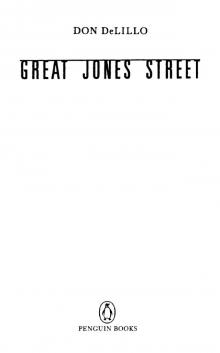 Great Jones Street (Contemporary American Fiction)
Great Jones Street (Contemporary American Fiction)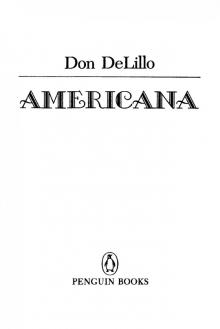 Americana
Americana Running Dog
Running Dog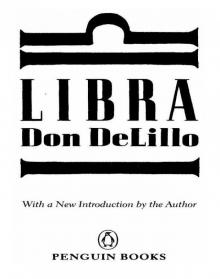 Libra
Libra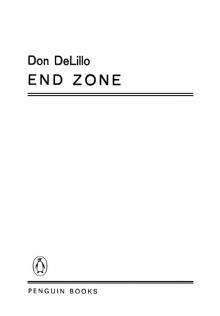 End Zone
End Zone Ratner's Star
Ratner's Star Underworld
Underworld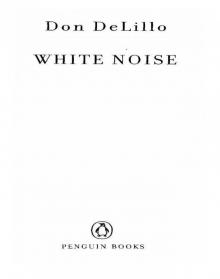 White Noise
White Noise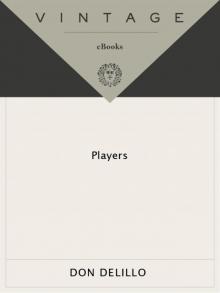 Players
Players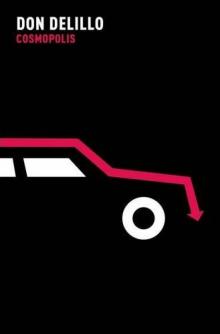 Cosmopolis
Cosmopolis The Silence
The Silence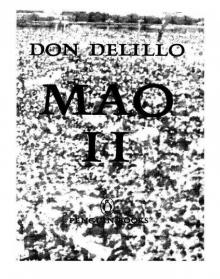 Mao II
Mao II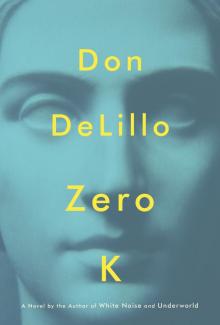 Zero K
Zero K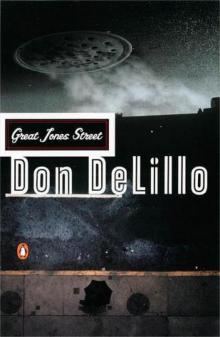 Great Jones Street
Great Jones Street The Angel Esmeralda
The Angel Esmeralda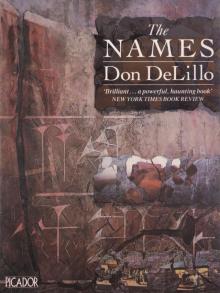 The Names
The Names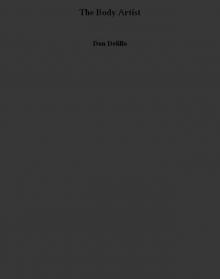 The Body Artist
The Body Artist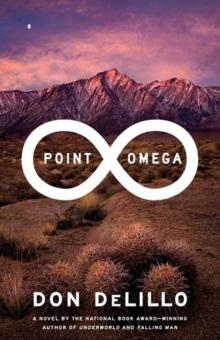 Point Omega
Point Omega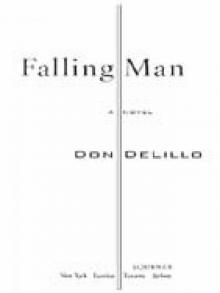 Falling Man
Falling Man